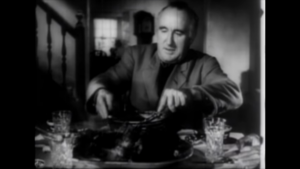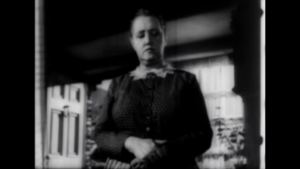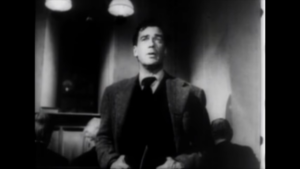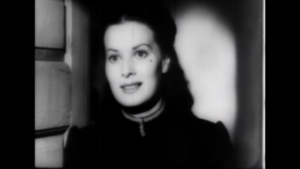Rating: 3 out of 5



I actually never heard of How Green Was My Valley. This shows how much I know about films, especially those old-school movies. I should’ve spent more time watching Turner Classic Movies. Well, while looking up this movie, I saw that it was nominated for ten Academy Awards. Being nominated for that many Academy Awards must mean you are excellent. The film famously beat and upset Citizen Kane, Sergeant York, and The Maltese Falcon for Best Picture. Beating Citizen Kane really caught my attention because that is supposed to be one of the greatest films ever made. Even though I don’t think it should’ve beaten Citizen Kane at the time of writing this review, and if I heard what is true about The Maltese Falcon, it shouldn’t have defeated that one either, but hey, upsets do happen. I can’t hate on a film that managed to beat the odds.

How Green Was My Valley is directed by John Ford and based on the best-selling 1939 novel of the same name by Richard Llewellyn. The film is more of a flashback of the main character’s life for what seems like a year but maybe two or three years. Told as a flashback by older Huw Morgan. Huw is an old man who has decided to leave the valley forever after living all of his life in the valley. Huw tells his family life story in a Welsh valley’s town from his view as a paradise to a ruined coal mining region. The youngest member of the Morgan clan, Huw lives with his five adult brothers and father, who work in the mines. He also lives with his one sister and mother. It is a HUGE family. Life is peaceful in the valley until conflict arises between management and laborers. This leads to arguments within the family as individual members each have different views of their role in the mine. With this, Huw becomes smitten by Bronwyn, who has come to the village to marry his eldest brother Ivor. A new preacher arrives by the name of Mr. Gruffydd, where Huw’s only sister, Angharad with him. As life goes on in the valley, Huw obtains an education that his siblings never had. Still, as the young Huw mind grows from books and schooling, his family history and turmoil have him lose his youthful innocence in the face of a family tragedy.
Okay, first and foremost, the one problem I have with this film is the length. I started to get bored of it about 75% through and hoped that it would end rather quickly, but it kept going and going and going. If this film was cut down by like twenty minutes, then it would’ve been great. Don’t get me wrong, the movie has many highlights, but it’s just a tad bit long without much action to go off on.
Now for the actual film. It’s one of those films where the main character, Huw, tells why he is leaving the village. In the beginning, he is packing his stuff in the shawl my mother used to wear when she went to the market. You think he had a wonderful childhood because he states, “I am leaving behind me my fifty years of memory……….I can close my eyes on my valley as it is today – and it is gone – and I see it as it was when I was a boy. Green it was and possessed of the plenty of the earth. In all Wales, there was none so beautiful.” Now first off, homeboy, after watching your story, you actually stayed in the village after everything that happened to you during those one or two years. I would’ve bounced immediately. Then as you watch, you realize that Huw saw his once proud and loving family and village go from being a loving place to being absolutely a sad memory that shaped him as the person he is when he finally decides to bounce.

Huw’s life and comparison to his valley being green are at the beginning of the film. This is where the happiest moments are in his life and what he learned from his father, who significantly influenced his life. There are a few scenes that Huw points out. First were the scenes with his family. His sister Angharad had a singing voice of an angel. Damn, that voice was lovely, but we see that Huw’s family, the Morgans were a proud family who all worked as a coal miners. After a hard day’s work, the men would sing home. When they got home, they would go in the back and wash or, as they call it, the scrubbing. Angharad would bring hot water, and the boys would scrub, and even though some would come off, the badge of honor was the coal that stated on them. At family dinner, it was a time where no words were spoken because no talk was better than a good meal. The funniest part of this scene was when Huw tried to take bread before saying grace, and everyone gave him the evil eye. His father believed everyone in the house deserved their fair share and gave them their money to spend because he didn’t believe in banks and thought it was best to spend the funds. His father also taught to walk softly past the chapel as a show of respect.
Another scene is when Bronwen came into the family life. Huw saw her and was so smitten by her even though she was marrying his older brother Ivor. He straight up stares at her with his mouth all wide open. Homegirl was cute. When Ivor and Bronwen got married, that party was freakin off the chain, lit, and poppin all at the same damn time. The whole damn town came through to celebrate. Some of the funniest scenes are when the cake makers almost dropped the cake, the dad singing while doing a chalk line, and the dude who filled his whole hat up with beer.

Now with any happy moments, we know that life will hit you hard, and the film proceeds to go to the sad times in Huw’s life when his valley started to change and not be green anymore. First, bad news hit as the mining place puts up a poster stating that wages will be cut. This causes a significant splinter in the family. Huw’s brothers want to strike, and their father is very against this. This argument shows at dinner when the once no talk rule is thrown out of the window. When the men strike, this brings an even further splinter in the family as the sons bounce, and most of the town blames Gwilym because they know he was against the strike. This causes Huw’s mother, Beth, to berate the men for their harassment. What happens after this?? Beth and Huw fall into a river during winter and lose the function of their legs for several months.
When the strike ends, you would think good fortunes are ahead, but it doesn’t matter for the Morgan family, which is when the Morgan family really starts falling apart. Many people are laid off from the mine, and among them were Owen and Young Gwilym. They decide to forsake the valley to go to America and, without a word, slip out during the night. Punk move, not to say bye to your mama. Ianto and Davy are also not left without harm. They were considered the best workers in the colliery but too highly paid to compete with poorer, more desperate men. The family even splinter more as they move away to find better and profitable opportunities. Another stark scene of how bad things were is when Angharad decides against her love and conscience to Iestyn Evans, the asshole and son of the mine owner. Her wedding seemed to be so loveless as the Morgans exit following a grim marriage ceremony. Unlike Ivor and Bronwen’s wedding, none of the men sing in the streets, and no one throws a major party. Gwilym has to ask people to sing for his daughter. She moves away with her new husband. Finally, with the family, some deaths happen in the mine.
Now since this is about the life of Huw, we see him going to a private school, and that was creepy as hell. When he walks in, all those kids look at him like he had some type of disease. Mr. Joad, a person who is supposed to teach and mold young minds, harasses and insults him. Huw also gets in a fight with a stuck-up kid who actually whips his ass. The following scenes show grit as Gwilym asks a few men to help teach Huw how to fight. This actually helps as Huw whoops some ass but in return is beaten so severely by his teacher Mr. Joad that he can hardly stand. What I like most is when his community comes and beats the hell out of Mr. Joad. Also, the film shows the loss of innocence of youth in Huw. First, homeboy could go to college because his grades are so good, he passed with honors. You know what this fool decides? To work in the freakin mines. I was with his dad because he wanted him to leave, but his mom’s ignorant ass thinks working in the mines is excellent. When you see him push that cart full of coal, you see he will never get out.

Now the cinematography is excellent in this film because it showed that the valley is the actual community. In scenes like when the men are done with working and come home singing, the camera shows the long line of men and how cheerful they are with nothing but black ash all over them. The wedding scene or when Beth gets better, and the camera pans to show the community singing and coming to greet her. All these shots were so well done that they showed the valley as one significant community rather than a bunch of individuals living there. That everyone is for each other.
As far as the acting goes, there were a few noteworthy performances. As Mr. Gruffydd, pastor of the village chapel, Walter Pidgeon was a strong presence as he seemed to be a voice of reason and be a mentor for Huw. Now he did fall in love, and that pissed off his deacons, but he sure did call their asses out for his final sermon. Donald Crisp as Gwilym Morgan was excellent as that father who is old school and wanted the family to be together. The scene where he was soaking his feet and smoking the pipe was priceless. As Mrs. Beth Morgan, Sara Allgood also had a powerful performance as she spoke her mind to her children and the townsfolk when they threatened her family. She was ready to put her paws on people. Roddy McDowall as Huw Morgan did a nice job. Even though he didn’t say much throughout the whole film, you saw a person’s growth through his eyes.
How Green Was My Valley is an enjoyable movie that shows the ups and downs of a family through the youngest member’s eyes. Do I believe it should’ve beaten Citizen Kane or The Maltese Falcon? Probably not. Like I said, it’s good but not all-time great. The acting was good, and the cinematography is one of the highlights. Give this classic film a try.